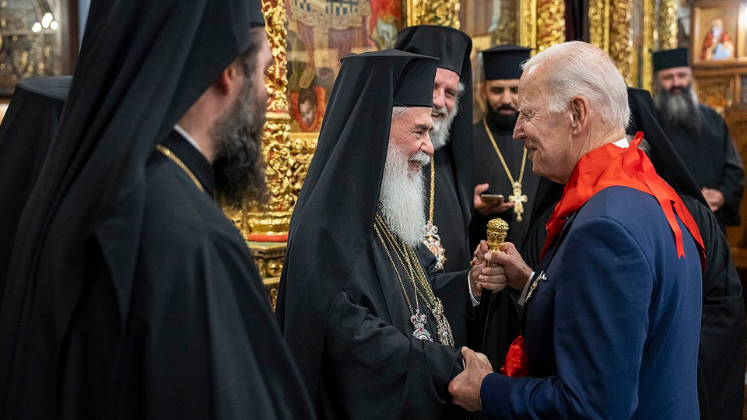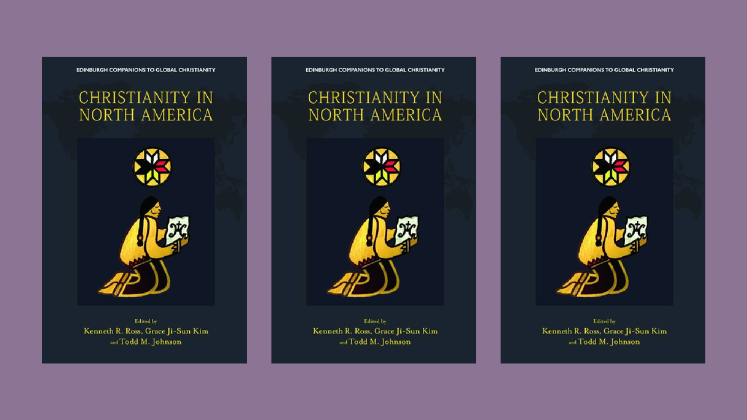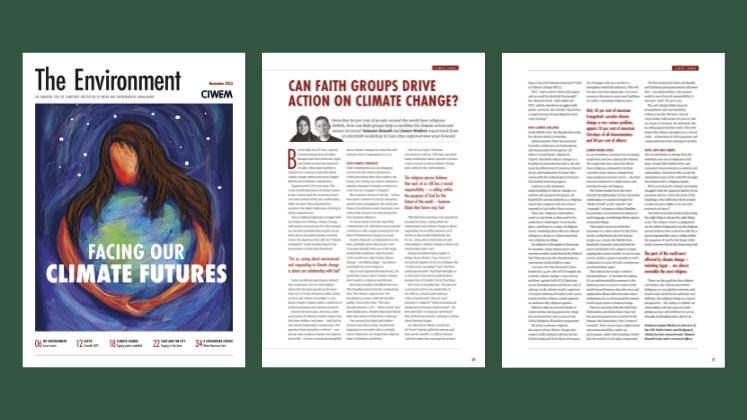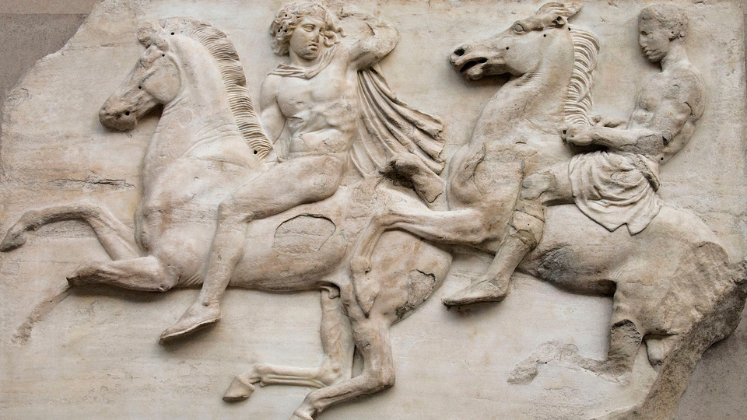Can religion and politics ever be separated? What about in the context of the US presidential campaigns? With one year to go until the 2024 elections, Kristian Noll takes a look at the presence and position of faith.

Faith’s Historic Role in the American Polity
American politics and religion cannot be divorced. The founding of the United States and the conceptualisation of its federal political system were intimately intertwined with the guarantee of an unlimited – yet, importantly, non-prescriptive – promise of free religious expression. Codified in Article IV of the Constitution, ‘no religious Test shall ever be required’ to hold public office, yet the de facto religious allegiance of the nation and its leaders has remained a source of controversy and discussion throughout its history.
The role of faith in partisan political life has arguably never been more impactful than in the contemporary political era. The widespread and overwhelming support Donald Trump garnered from the evangelical community in the 2016 and 2020 elections (77 and 84 percent, respectively) are oft-cited metrics demonstrating this phenomenon; however, the bond between religion and politics goes much deeper. The Supreme Court under Chief Justice John Roberts has ruled in favour of religion in 85 percent of heard cases — more than any other court in recent history — and religious symbols and rhetoric are increasingly on display in ideological and political. A particularly salient manifestation of this phenomenon is Christian nationalism, unashamedly on display at the insurrection at the US Capitol on January 6, 2021.
The Instrumentalisation of Faith in the 2024 Electoral Cycle
As we look forward to the highly anticipated November 2024 election, we should not be surprised at how much attention is again being directed at evangelical support for Donald Trump. In contrast to previous years, however, Trump ostensibly does not command unchallenged support from this electorate. On the contrary, waning unified support for the former president has motivated other Republican presidential hopefuls to direct their campaigns to woo undecided Evangelical voters. Former vice president Mike Pence* and South Carolina Senator Tim Scott, both outspoken Christians, are understandably potential alternatives. Recently, however, Florida Governor Ron DeSantis — himself a quiet Catholic who rarely discusses his faith publicly — has entered the race for evangelical support.
In September, DeSantis launched his Faith and Freedom Coalition, a group of more than 70 religious leaders who have endorsed the governor for the Republican nomination. Such an announcement is a standard campaign exercise; however, where DeSantis veers from convention is how he leverages religious rhetoric in the presentation of his politically conservative agenda. ‘Put on the full armor of God. Stand firm against the left’s schemes’, as heard at a February 2022 event at Hillsdale College (Michigan), has been a consistently drawn weapon in the governor’s linguistic arsenal. Ostensibly, the governor’s campaign believes that employing religious rhetoric will convince evangelical voters of his religious convictions and propel him to the Republican nomination. However, by adopting increasingly vitriolic rhetoric to demonise political opponents, DeSantis’ primary aim is not to present the theology informing his politics, but rather to instrumentalise faith in framing political debates as a sacred struggle between good and evil. This is a dangerous path.
The ongoing struggle for the evangelical vote and DeSantis’ recent foray into the faith-based rhetorical crusade against political opponents should give us pause and inspire reflection on the marriage between faith, particularly evangelical Christianity, and US politics.
A Changing Religious Landscape
Although the United States Constitution prescribes a separation between church and state and guarantees religious freedom, the country’s legislators remain overwhelmingly Christian. In fact, 87.8 percent of the 118th Congress and 63 percent of American adults identify as Christian. Given these statistics, it makes sense that Christian faith is intimately intertwined with the public profiles of political figures. The Republicans are not alone in this; the Catholicism of Democratic President Joe Biden is well documented, if not an axis of controversy in the political debate surrounding abortion. However, it is important to note a slow but significant trend towards religious disaffiliation. If current trends continue, less than half of the US population will identify as religious by 2070. In other words, the United States remains a uniquely devout country; however, this will change, and the political ramifications of this shift will be profound.
The Idolatry of Ideology
For all the attention given to faith in American politics, the partisan divide on display in the United States appears to be primarily ideological. A significant majority of (even religious) Americans believe that religion and government policies should be kept separate, and it seems candidates agree. Faith-based rhetoric, whether DeSantis’ calls to don the ‘armor of God’ or Biden’s repeated emphasis on the ongoing struggle ‘for the soul of the nation’, fundamentally revolves around a left-right ideological axis rather than a religious one. After all, Biden and DeSantis share faith, yet represent diametrically opposed political camps. This illustrates excellently the ongoing politicisation of religion, saliently manifested in policy debates around the climate. For what other reason would nearly 92 percent of highly religious Americans believe that God gave them a duty to protect the earth but only 42 percent of them believe climate change is a serious problem?
A Repetition of History
In an age of increasingly vitriolic religious rhetoric, it is helpful to remember that religious strife in American political life is not a new phenomenon. 63 years ago, John F. Kennedy, a Catholic, stood before a group of Protestant ministers to make a vital campaign speech. Kennedy’s aim was neither to present a policy platform nor to raise funds. No, his aim was to convince Protestant Americans that his Catholicism would not impede impartial decision-making should he win the presidency. In this speech, Kennedy made several points worth bringing back to the fore of the debate.
First, he pointed out that ‘[the United States] has far more critical issues to face in the 1960 election [than religion]’. In his words, these included ‘the spread of Communist influence…the humiliating treatment of our president…hungry children….[and] an America with too many slums…too few schools, and too late to the moon and outer space’. This sentence is easily translatable to the current era: ‘We have far more critical issues to face in the 2024 election: the spread of vitriolic rhetoric and right-wing isolationism, war in Ukraine and the Middle East, the threat of pandemics, climate change…’ The list goes on.
Second, Kennedy presented a striking vision for an America where ‘there is no Catholic vote, no anti-Catholic vote, no bloc voting of any kind’. We could not be further from realising this vision.
Third, and finally, the kind of nation Kennedy believed in was a nation where ‘no one suggested that we may have a “divided loyalty”, that we did not “believe in liberty”, or that we belonged to a disloyal group that “threatened the freedoms for which our forefathers died”’. Unfortunately, this rhetoric is all too familiar.
I — alongside many others I’m sure — feel dismayed when biblical rhetoric is instrumentalised by political candidates who share my faith to condemn those with whom my political sympathies lie. Yet I find solace in reflecting on the fundamental tenets of the American constitutional promise of religious freedom and the opportunity such a principle provides for faith to be an entry point for dialogue and compromise. Engaging in such reflection in now more important than ever.
*Although Mike Pence has since dropped out.





